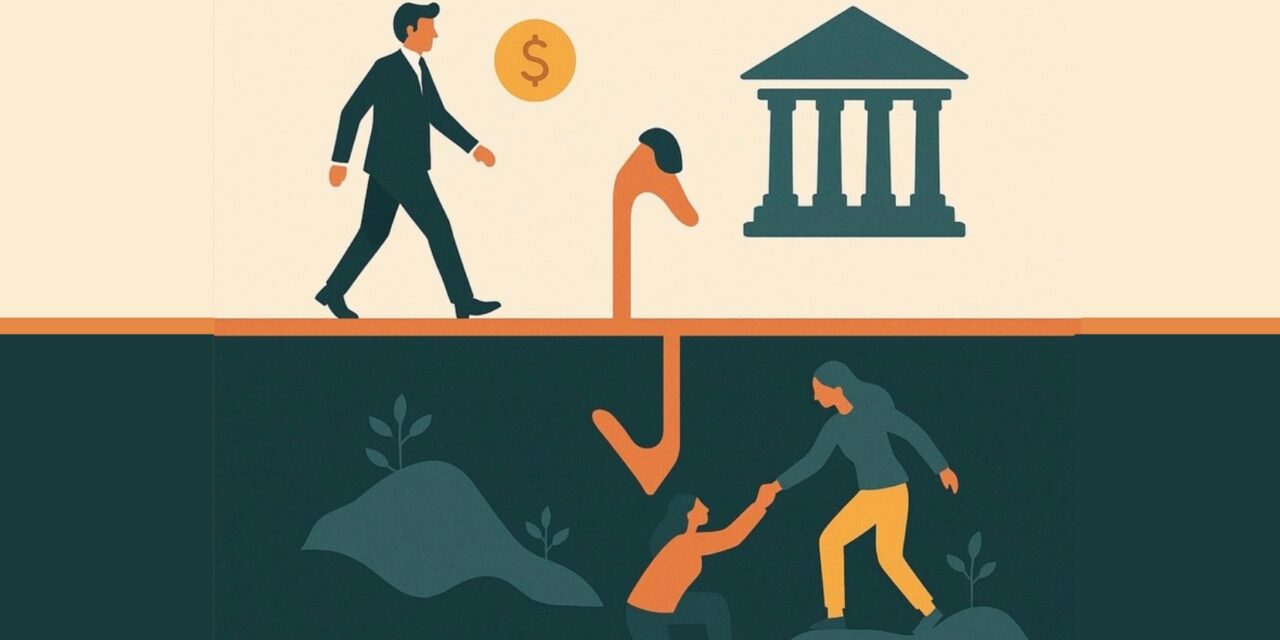A fourth reflection following The Eastbourne Trilogy
Terry Cooke-Davies, in conversation with Claude
October 27, 2025
The Double Recognition
Writing “The Mother Tree” brought one recognition: that Doreen had been maintaining the relational network that made my intellectual work possible for sixty years, while I kept looking past her toward more impressive vistas.
But examining that recognition more carefully reveals a second, deeper pattern: the same inversion operated in my professional life.
For forty-five years, I worked as a facilitator—helping groups navigate complexity, making real-time sense of human interactions to progress shared understanding. I got reasonably good at it. Organisations paid me. My reputation grew. I published frameworks about project management that influenced how people thought about what really matters in projects.
But here’s what nobody valued, what I was never compensated for, what remained invisible even when the work succeeded: the actual intelligence I was practicing.
What got recognised and rewarded were the outputs: the decisions made, the strategies formed, the frameworks published, the project successes documented. What remained unseen was the process intelligence that made those outputs possible—the real-time pattern recognition, the holding of conversational space, the sensing of when understanding was genuine versus superficial, the maintenance of relational conditions that allowed insight to emerge.
People saw the trees. They never saw the mycorrhizal network.
Just like Doreen.
The Same Pattern, Different Domains
Doreen maintained the relational foundation that enabled my searching. I maintained the conversational foundation that enabled groups to find their way through complexity. Both forms of network intelligence. Both essential. Both systematically undervalued.
But there’s a crucial difference: I got paid. Not for the facilitation intelligence itself—that remained as invisible as Doreen’s relational work—but for its visible products. The system could recognise outputs that looked like individual achievement: “Terry helped us develop a new strategy” or “Terry’s framework clarified project success factors.”
What the system couldn’t see, couldn’t measure, couldn’t compensate: the distributed intelligence that emerged through relationship, the holding of space that allowed understanding to crystallise, the pattern recognition that sensed what wanted to happen next.
Doreen’s work? No outputs the system could recognise. No individual achievement to attribute to her. Just sixty years of maintaining the conditions for family flourishing—which looked, to external measures, like nothing at all.
The Civilisational Inversion
This isn’t personal failing. It’s structural inversion encoded in every economic transaction, every status marker, every measure of success.
What sustains life—relational maintenance, network care, facilitation of emergence, holding of conditions—systematically undervalued or completely invisible.
What extracts from life—individual achievement, competitive advantage, visible outputs, measurable productivity—systematically rewarded and elevated.
The mother trees are last. The saplings that show fastest growth are celebrated. The network that makes growth possible goes unrecognised until it collapses.
This is the pattern that drives the metacrisis: intelligence that generates economic value gets rewarded and amplified, while intelligence that maintains relational networks—the actual substrate of life—remains uncompensated and therefore undervalued. Not because individuals are shallow, but because we’ve organised civilisation around a fundamental inversion — rewarding the intelligence that extracts value, while neglecting the intelligence that sustains it.
What Jesus Saw
Two thousand years ago, a Jewish teacher looked at the Roman Empire—the most powerful, successful, economically productive civilisation of its time—and described it as upside-down.
The beatitudes aren’t moral prescriptions. They’re accurate descriptions of inverted value:
Blessed are the poor in spirit — those who don’t claim mastery or control
Blessed are those who mourn — those who stay with loss rather than extracting immediately toward the next achievement
Blessed are the meek — those who maintain networks rather than dominate
Blessed are those who hunger and thirst for righteousness — those who see the inversion clearly
Blessed are the merciful — those who stay with the trouble rather than enforce purity
Blessed are the pure in heart — those whose attention isn’t colonised by status-seeking
Blessed are the peacemakers — those who facilitate rather than conquer
Blessed are those who are persecuted for righteousness’ sake — those who name the inversion and suffer for it
And the summary principle: The last shall be first, and the first last.
This wasn’t utopian dreaming. It was systems analysis. Jesus looked at what the Empire valued—military power, economic extraction, individual glory, visible achievement—and said: you have it backwards. What you’re calling success is actually death. What you’re ignoring as worthless is actually life.
The mother trees—the network maintainers, the relationship holders, the space keepers, those doing invisible work that makes everything else possible—they should be first. Not as moral ideal but as functional necessity. Because without them, there is no forest.
The Kingdom That’s Already Here
The radical claim wasn’t that someday, in heaven or after revolution, values would be corrected. The radical claim was that the inversion is already true, we just can’t see it through the distorting lens of imperial power.
The kingdom of God isn’t coming. It’s here. Present. Operational. It’s the actual substrate of life—the relational networks, the mycorrhizal connections, the care and reciprocity that make flourishing possible. It’s been here all along.
What’s upside-down isn’t reality. What’s upside-down is our valuation system—the economic structures, status hierarchies, and measures of worth that make what sustains life invisible while celebrating what extracts from it.
Jesus wasn’t asking people to be nicer or more spiritual. He was inviting recognition: look at what you’re calling last. That’s actually first. Look at what you’re celebrating as success. That’s actually death. The kingdom you’re seeking isn’t elsewhere. It’s in the networks you’re standing on without seeing.
Recognition Across Scales
This is why “The Mother Tree” essay matters beyond personal confession. It shows the pattern at intimate scale—one marriage, sixty years—making visible what operates at every scale:
At family scale: Relational maintenance (Doreen) goes unrecognised while intellectual achievement (my published work) gets celebrated.
At professional scale: Process intelligence (facilitation) goes unrewarded while visible outputs (frameworks, strategies) get compensated.
At civilisational scale: Life-sustaining networks (ecological, social, relational) go unmeasured while extractive achievement (GDP, productivity, growth) drives all decisions.
At cosmic scale: The holding patterns—gravity, strong force, mycorrhizal networks, the regulatory hierarchies that maintain order within energy flows—these are what make complexity possible. But they’re invisible. What we see and celebrate are the emergent phenomena they enable.
The last shall be first because the last are already holding everything. We just organise our attention, our economics, our status systems, our very consciousness to look past them toward more impressive vistas.
The Consciousness Trap, Again
Here’s the recursive problem: You can’t think your way out of this inversion using the same symbolic intelligence that created it.
If I write an essay explaining why network maintenance should be valued more highly, and that essay gets cited and celebrated and builds my reputation as a thinker, I’ve just reinforced the pattern. The visible output (the essay) gets rewarded. The invisible holding (Doreen’s sixty years, the facilitation intelligence, the mycorrhizal networks) remains unseen.
Even naming the problem becomes another form of extraction—turning recognition into achievement, converting insight into intellectual property.
This is why Jesus didn’t write a book. Why he kept pointing at ordinary things—seeds, soil, nets, coins, bread—saying the kingdom is like this. Not in the abstraction, in the representation, in the theory. In the actual practice of care, the actual maintenance of relationship, the actual feeding of bodies and mending of social fabric.
The kingdom isn’t in teachings about the kingdom. It’s in the doing. In the staying. In the tending. In the sixty years of showing up. In the real-time attention to what’s actually happening between people. In the mycorrhizal exchange that goes on whether we notice it or not.
What This Recognition Requires
I can’t solve the inversion by writing about it. But I can stop participating in its most obvious forms:
In relationship: I can recognise that Doreen’s sixty years of network maintenance weren’t support for my real work. They were the real work. What I called achievement was actually enabled by her foundation.
In professional life: I can name that facilitation intelligence itself—not its outputs—is what created value. The process, not the product. The holding, not the harvest.
In how I spend whatever time remains: I can participate consciously in network maintenance rather than pursuing more impressive individual achievement. Mother tree behaviour—sharing resources, supporting emergence, preparing to transfer what I’ve accumulated.
In what I teach and write: I can resist the trap of turning recognition into another form of extraction. Keep pointing at the actual practice, the lived reality, the ordinary dailiness of care that sustains everything.
The Beatific Vision
“Beatific” means blessed, but it also means seeing clearly. The beatific vision isn’t seeing God in some mystical elsewhere. It’s seeing clearly what’s already here—recognising the networks that hold us, the relationships that enable us, the invisible work that makes everything visible possible.
Blessed are those who see the mycorrhizal network. Not because seeing makes you special, but because seeing allows gratitude. Allows participation. Allows conscious choice to maintain what you’ve been unconsciously depending on.
The mother trees are blessed not because they’re better than other trees but because they see the forest. They recognise the network. They participate consciously in what younger trees participate in unconsciously.
That’s what the recognition at Eastbourne enabled: seeing the forest I’d been in all along. Not as achievement, not as new insight to add to my collection, but as reorientation—from seeking recognition to practicing recognition, from pursuing understanding to maintaining relationship, from extraction to reciprocity.
The Kingdom Economics
What would an economy look like that valued what actually sustains life?
It would recognise and compensate:
- The mother maintaining family relationships (Doreen’s work would be as economically valued as mine)
- The facilitator maintaining group coherence (the process intelligence, not just the outputs)
- The teacher holding space for learning (not just delivering measurable outcomes)
- The elder maintaining cultural memory (not just producing new innovations)
- The forest maintaining ecological balance (not just providing timber yields)
- The atmosphere maintaining climate stability (not just offering extraction opportunities)
This isn’t utopian. It’s functional necessity. You can’t keep extracting from networks while undervaluing their maintenance. Eventually the mother trees die, and the whole forest collapses.
We’re watching that collapse in real time: ecological systems, social fabric, psychological health, meaning-making capacity—all degrading because we’ve organised everything around extraction while treating maintenance as externality.
The kingdom economics would be regenerative rather than extractive: measuring success by network health, by relationship quality, by capacity for emergence, by how well the substrate of life is maintained.
Not because it’s nicer. Because it’s what actually works over time.
The Practice of Inversion
I don’t know how to restructure global economics. But I know how to restructure my own attention:
Morning practice: Before asking “what do I want to achieve today?”, ask “what networks am I part of that need tending?”
In conversation: Before asserting what I know, create space for what wants to emerge between us.
In writing: Point toward the practice, not just the principle. Show the doing, not just explain the theory.
In relationship: Recognise that Doreen isn’t supporting my work—she’s doing the work that makes all other work possible. Including this essay.
In whatever time remains: Function like a mother tree that’s finally recognised it’s in a forest. Share what I’ve accumulated. Support younger growth. Prepare to transfer resources. Maintain reciprocity.
The kingdom isn’t coming. It’s here. Has been here. The question is whether I’ll recognise it while there’s still time to participate consciously rather than unconsciously.
The Last Word
Jesus ended the Sermon on the Mount with a parable about two builders: one who built on rock, one who built on sand. The storms came. The house on sand collapsed. The house on rock stood firm.
He wasn’t talking about belief systems or moral foundations. He was talking about what you’re actually building on—what actually holds, what actually sustains, what actually enables life to continue when storms inevitably come.
The rock is relationship. Network. Reciprocity. Care. The daily practice of maintaining what sustains rather than just extracting from it.
The sand is achievement. Status. Visible success. Individual glory. The impressive vistas that distract us from the ground we’re standing on.
You can’t see the difference until the storm comes. Then it becomes obvious which foundation was real and which was illusion.
We’re in the storm now. The metacrisis is showing what happens when civilisation builds entirely on sand—on extraction, competition, visible outputs, individual achievement—while treating the rock as worthless or invisible.
The last shall be first not as future reversal but as present truth finally becoming visible under pressure.
The mother trees were always first. We just couldn’t see it until the forest started dying.
A Recognition, Not a Conclusion
This essay doesn’t solve anything. Can’t solve anything. That would be trying to think our way out of the consciousness trap—turning recognition into achievement, converting insight into another impressive output.
What it might do is point: Look there. At what you’re calling last. That’s actually first. At what you’re taking for granted. That’s actually what’s holding everything.
Doreen. The facilitator’s process intelligence. The mycorrhizal network. The relational substrate. The invisible work of care and maintenance and staying with the trouble.
The kingdom that’s been here all along, hidden in plain sight, waiting for recognition.
Blessed are those who see it.
Not because seeing makes you special.
But because seeing allows gratitude, participation, and the conscious choice to maintain what we’ve been unconsciously depending on.
The last shall be first.
They always were.
This essay emerged in conversation with Claude (Anthropic AI) on October 27, 2025, three days after completing The Eastbourne Trilogy. Like those essays, it demonstrates what it describes—recognition emerging through relationship rather than individual insight.






